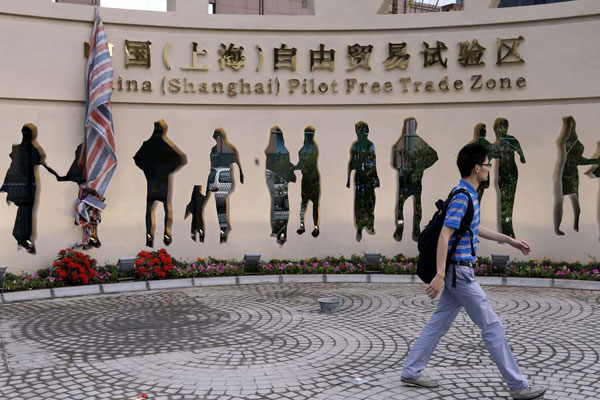 |
|
The name plate of the China (Shanghai) Pilot Free Trade Zone on a gate of the Waigaoqiao free trade zone in Shanghai. ZHAO YUN / FOR CHINA DAILY |
Authorities in the China (Shanghai) Pilot Free Trade Zone eliminated more than a quarter of the restrictions on foreign investors on Tuesday.
The zone's original "negative list", which outlines forbidden or restricted areas for foreign investment activities, had been criticized for having too many restrictions and a lack of transparency.
"The new list features more openness and transparency and is more in line with international standarministration committee of the zone, said at a news conference. For example, the zone has lifted the nine restrictions on foreign investment in manufacturing, four in commercial services and two in shipping services.
 |
 |
The 28-sq-km pilot zone was launched in September 2013. Its negative list now contains 139 clauses of restrictions and prohibitions. The guideline was approved by the State Council on Saturday, and will take effect immediately, Dai said.
Chen Bo, a professor at Shanghai University of Finance and Economics, said some of the reforms are not in line with the real demands of foreign investors.
"Clauses concerning companies in agriculture, manufacturing or mining account for more than 60 percent of the negative list. Yet it is unlikely that they will get registered in the zone because the cost of land in the area is very high," Chen said.
"Most foreign companies that want to do business in the FTZ are service-based, especially financial institutions, yet there were not too many changes in these areas."
Sun Lijian, director of the Financial Research Center at Fudan University, said many vague clauses that could have led to misunderstanding have been removed.
Sun expected the restrictions for 2015 will be further shortened.
In June, 207 new foreign-funded enterprises were registered in the Shanghai zone, six times more than in October when it was launched. So far, 1,240 foreign businesses have registered in the zone.
Industrial associations, foreign companies and research institutes were consulted in preparing the revised list, according to the Shanghai municipal government.
